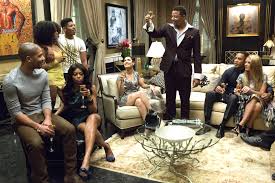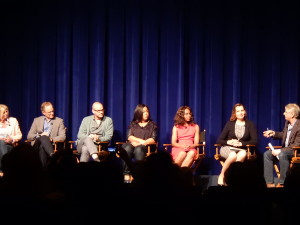 Conquering discrimination in the entertainment industry, whether that bias in hiring practices is conscious or not, is a difficult and complex topic.
Conquering discrimination in the entertainment industry, whether that bias in hiring practices is conscious or not, is a difficult and complex topic.
The subject engendered a frank and sometimes painful discussion as the Writers Guild of America, West hosted a panel called “Exploring Unconscious Bias,” moderated by showrunner Glen Mazzara. The panelists were executive producer Shonda Rhimes (“Grey’s Anatomy,” “Scandal,”” How to Get Away with Murder”), actor Geena Davis (“Thelma & Louise,” “Commander in Chief”), who runs the Institute on Gender in Media, writer/director/executive producer and Oscar winner Callie Khouri (“Thelma & Louise,” “Nashville”), director/producer Todd Holland (“Malcolm in the Middle”), executive producer Peter Paige (“The Fosters”) and Google’s Judith Williams, the search giant’s manager of global diversity and talent programs.
Unconscious bias is defined as the stereotyping of women and people of color that affects their opportunities in the business.
Mazarra, who ran “The Shield” and was executive producer of the popular series “The Walking Dead,” gave a lengthy opening statement in which he described instances of being thwarted when it came to hiring anyone but middle-aged white men.
“It was important to me to push forward, but there was tremendous pushback – and the agencies were no help. It was difficult to talk about this in an honest way,” he said. “Hollywood is conservative and afraid to take a risk. I heard comments like, ‘I had a black writer once and it didn’t work out.’ Someone questioned whether having women writers in the room would mean they talked about their periods. One person commented that I must have an Asian fetish because I hired two Asian writers. It was shocking that these comments were made recently and not decades ago. It’s a systemic problem and it’s very complex. People need to be educated.”
While noting that Fox and ABC are taking diversity seriously, Mazarra—who is currently executive-producing the horror miniseries “Damien”– said the WGA is strengthening access programs for women, minorities, LGBT and members over 55 years old, as the entrenched Hollywood system is set up to mentor young white males.
The twin topics of diversity and discrimination have been front and center recently with the bounty of television programs and upcoming pilots that feature nonwhite actors. They include NBC’s “The Curse of the Fuentes Women” and “Love Is a Four Letter Word,” CBS’ “Rush Hour” and ABC’s “Uncle Buck.”
Yet Davis, founder and chair of the Geena Davis Institute on Gender in Media, said its research revealed that little of Hollywood’s overall entertainment product is gender-balanced.
For example, she said only 17% of crowd scenes in animated and live action films are female. “The only theory I can come up with is that writers think that women don’t gather,” she said, garnering laughter from a crowd of about 300 people that filled the Writers Guild Theater in Beverly Hills for the event, held on April 20.
The danger in such portrayals is that children consuming entertainment at an early age are unconsciously trained that women are less valuable than men and boys, a type of thinking that can carry over into adulthood and perpetuate gender discrimination.
Google’s Williams, the only panelist to have a PowerPoint presentation, said that diverse teams in any business foster what she called “creative abrasion,” which leads to innovation. “We need to think about things we’re not seeing,” she said.
Davis, who portrayed the first female U.S. president on “Commander in Chief,” the short-lived yet acclaimed ABC series that ran in the 2005-06 season (Cherry Jones on “24” as President Allison Taylor came in 2010), said that the simplest solution is to write it in the script. As in, “A crowd gathers that is half female.”
Rhimes said that she encountered resistance when she tried to make the background players in her programs at least 50% female and 30% minority. “It took them a long time to wrap their heads around that concept. It’s really interesting when you try to change the flow of traffic in a hospital or in the White House. You’re changing the ecosystem,” she said. “So it was a big deal, changing layer by layer by layer.”
But behind the scenes, the numbers tell a similar, and unequal story. A 2015 television staffing brief researched for the WGA revealed that less than 6% of executive producers this season were minorities and that staff writing jobs were just 3.5% minority.
Mazzara aimed to focus the discussion on solutions that could be implemented by the people on stage, asking them what they are doing to implement change.
Paige noted that ABC Family has had great success in diversity, including with “The Fosters.” “It takes two seconds to make a decision to make things a more accurate reflection of the world,” he said.
Khouri agreed, saying she fights to have women seen as being as competent as men, a struggle that started with “Thelma & Louise.” “If you have be a ____ bitch,” she said,” go ahead.”
The event was sponsored by Google, The Writers Guild of America, West, the Directors Guild of America and the Davis Institute.
–Hillary Atkin


